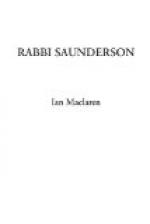Among all the institutions of the North a Presbytery is the most characteristic, and affords a standing illustration of the contradictions of a supremely logical people. It is so anti-clerical a court that for every clergyman there must be a layman—country ministers promising to bring in their elder for great occasions, and instructing him audibly how to vote—and so fiercely clerical that if the most pious and intelligent elder dared to administer a sacrament he would be at once tried and censured for sacrilege. So careful is a Presbytery to prevent the beginnings of Papacy that it insists upon each of its members occupying the chair in turn, and dismisses him again into private life as soon as he has mastered his duties, but so imbued is it with the idea of authority that whatever decision may be given by some lad of twenty-five in the chair—duly instructed, however, by the clerk below—will be rigidly obeyed. When a Presbytery has nothing else to do, it dearly loves to pass a general condemnation on sacerdotalism, in which the tyranny of prelates and the foolishness of vestments will be fully exposed; but a Presbytery wields a power at which a bishop’s hair would stand on end, and Doctor Dowbiggin once made Carmichael leave the Communion Table and go into the vestry to put on his bands.
When a Presbytery is in its lighter moods, it gives itself to points of order with a skill and relish beyond the Southern imagination. It did not matter how harmless, even infantile, might be the proposal placed before the court by such a man as MacWheep of Pitscowrie; he has hardly got past an apology for his presumption in venturing to speak at all before a member of Presbytery—who had reduced his congregation to an irreducible minimum by the woodenness of his preaching—inquires whether the speech of “our esteemed brother is not ultra vires,” or something else as awful. MacWheep at once sits down with the air of one taken red-handed in arson, and the court debates the point till every authority has taken his fill, when the clerk submits to the moderator, with a fine blend of deference and infallibility, that Mr. MacWheep is perfectly within his rights; and then, as that estimable person has by this time lost any thread he ever possessed, the Presbytery passes to the next business—with the high spirit of men returning from a holiday. Carmichael used, indeed, to relate how, in a great stress of business, some one moved that the Presbytery should adjourn for dinner, and the court argued for thirty minutes, with many precedents, whether such a motion—touching as it did the standing orders—could even be discussed, and, with an unnecessary prodigality of testimony, he used to give perorations which improved with every telling.




